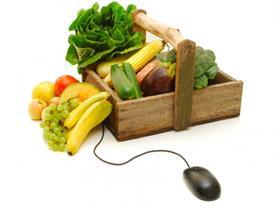
The UK’s grocery sector could see its profits cut by almost £250 million following the surge in online food shopping during the pandemic, according to new research by Euler Hermes.
The leading trade credit insurer estimates that for every percentage point that e-commerce increases its share of the UK grocery market, retailers stand to lose as much as £246 million of profit in additional costs associated with online fulfilment. E-commerce currently accounts for 12 per cent of revenue generated by UK supermarkets, making them by far the most exposed operators in comparison to their European counterparts. In France, the market share of online sales is 8 per cent while it is less than 4 per cent in Italy, Spain and Germany.
European food sales increased by more than 5 per cent in 2020 – twice the average annual growth rate seen since 2010 – and a further 2.4 per cent in the first half of this year despite Covid restrictions easing. Euler Hermes’ forecasts account for UK retailers operating with an EBITDA model of 3.7 per cent (European average) and -10 per cent profit margins for online fulfilment. More optimistic modelling with profit margins of -5% and 0% would still see the subsector’s profits fall by £156million and £66million respectively.
With retailers continuing to contend with supply issues, the trade credit specialist expects that the double threat to market share and profits will prompt retail boards to accelerate investment in their digital capabilities to establish profit parity between their online and physical operations.
The findings are in a new Euler Hermes report, European food retailers: The bitter digital aftertaste of the Covid-19 legacy. The report highlights that every percentage point of grocery sales that move online in the Eurozone threatens €13.6bn in sales and up to €1.9bn in profits (4 per cent of total).
Aurelien Duthoit, senior sector advisor for macroeconomic research at Euler Hermes, said: “The UK’s already well-developed appetite for online grocery shopping has left it overexposed by the surge in household demand during the pandemic. As we head into the traditionally busy ‘golden quarter’ amid disruption and increased costs across the supply chain, it’s imperative that retailers are able to meet any further uptick in online demand efficiently.
“While grocers are looking to attract customers back to their stores following successive lockdowns, they should be looking to rotate their investment to adjust for a sustained increase in e-commerce. Investment in the past 12 months has rightly focused on expanding online capacity but more sustainable models will need to prioritise profitability – including a redesign of current logistics infrastructure and extensive uptake of new warehouse automation technologies.
“We’d also expect to see fledgling partnerships between traditional retail brands and food technology businesses continue to blossom – be that delivery specialists, dark store operators or logistics companies offering software and warehouse services.”



